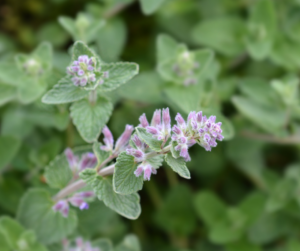Catnip: The Feline Favorite Herb
Latin Name: Nepeta cataria
Common Name: Catnip
Catnip, scientifically known as Nepeta cataria, is a beloved herb with a long history of use in both traditional herbal medicine and modern applications. Known for its enticing aroma and unique effects on cats, catnip offers various human health benefits. In this herbal materia medica, we will explore the traditional and modern uses of catnip and its potential benefits and contraindications.
Traditional Herbal Information
This herb has been valued in traditional herbal medicine for centuries. Herbalists use it to treat various ailments, including digestive issues, insomnia, and nervousness. It was also brewed into teas or tinctures to relieve headaches, reduce fever, and soothe menstrual cramps. In addition, its calming properties made it particularly popular for promoting relaxation and reducing anxiety.
Modern Applications
Today, catnip continues to be used for its medicinal properties and is also enjoyed as a culinary herb and ornamental plant. Here are some contemporary applications of catnip:
- Relaxation and Stress Relief: It is often used to promote relaxation and reduce stress and anxiety. It may help calm the nerves, ease tension, and promote a sense of calmness.
- Digestive Support: Catnip is believed to have mild digestive properties and may help soothe indigestion, bloating, and gas. It can be brewed into tea or taken as a supplement for digestive health.
- Sleep Aid: This herb is sometimes used as a natural sleep aid to help promote restful sleep and relieve insomnia. It may help improve sleep quality and reduce the time it takes to fall asleep.
- Pain Relief: Herbally it has mild analgesic properties and may help reduce pain and discomfort associated with headaches, menstrual cramps, and other minor ailments.
Uses and Benefits
Catnip offers several potential health benefits for humans. It can:
- Promote relaxation and reduce stress, it can be used in teas for a relaxing brew.
- Support digestive health and relieve indigestion
- Aid in sleep and ease insomnia
- Provides mild pain relief for headaches and menstrual cramps

Contraindications
While catnip is generally considered safe for most people, there are a few things to consider:
Allergies
Some individuals may be allergic to catnip and may experience allergic reactions such as skin irritation, itching, or swelling. In addition, it’s best to do a patch test before using catnip extensively.
Pregnancy and Breastfeeding
Pregnant and breastfeeding women should use caution when using catnip, as its safety during these times has not been well studied. It’s best to consult with a healthcare professional or herbalist before use.
Sedative Medications
Catnip may have sedative effects and may enhance the effects of sedative medications. Additionally, individuals taking sedative medications should use caution when using catnip.
In conclusion, catnip is a versatile herb with many potential health benefits. Whether used for relaxation, digestive support, or sleep aid, catnip is popular for promoting health and well-being.
Disclaimer
Disclaimer Blog
The information presented on the Heart of Herbs Herbal School/Demetria Clark websites is for educational purposes only. Heart of Herbs Herbal School/Demetria Clark Education LLC makes neither medical claims nor intends to diagnose or treat medical conditions. Links to external sites are for informational purposes only. Heart of Herbs Herbal School/Demetria Clark neither endorses them nor is in any way responsible for their content. Readers must do their own research regarding the safety and usage of any herbs, recipes, or supplements.
Affiliate Disclosure
Some posts contain affiliate links. When you click on these and make a purchase the cost is the same for you, but we earn a small commission that helps me to provide scholarships to students. We only promote products that we know our clients have liked themselves.
Heart of Herbs Herbal School is a Amazon affiliate. As an Amazon Associate, we earn from qualifying purchases.
I got a lot out of this class. I really enjoyed learning more about herbs and feel much more knowledgeable in the area. I love helping people and herbalism is an amazing way to do that. One of the things I got out of these studies is to start teaching children about herbs in different co-ops in my community. They have really enjoyed it and so have I. Through this class, I have gained the knowledge and confidence to be able to do that.
